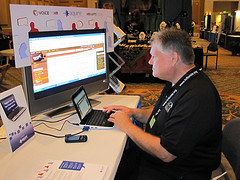Simpler Answers
Get the 'right people on the bus'.
Align corporate goals and objectives with individual employee's performance standards and development plans.
Ensure the organization is using it's compensation budget to reward the right employees and encourage the desired behaviors.
These are just some of the many truisms we hear, write, and repeat that attempt to describe what most organizations are striving for in their quest to increase performance, improve financial outcomes, and help sustain and grow the enterprise in the near and long term. Over time numerous technology solutions have been developed to help organizations achieve these and other lofty goals. And over time, the list of specific features and capabilities of most of the generally available solutions on the market have expanded to encompass more workforce processes, include support for more discrete talent related transactions, and provide better and faster access to analytical data that surrounds and is generated by these processes.
In fact, if we organized a 'feature and function' scavenger hunt on the floor of the expo hall at the HR Technology Conference there is likely not any specific talent and workforce management capability that some vendor could not support. Dynamic 9-Box generation with variable axis? Check. Standard reports describing cost and quality per hire? No problem. Integration of the traditional applicant tracking system with the social web? Everyone is doing that now.
No, the arms race for 'features' in some respects is pretty much over. The result? Everyone won. Or soon will. No doubt about it, the set of solutions available across the spectrum of HR and talent management processes has never been wider, better, and more impressive. If you can imagine it as an HR or talent pro, you can have it. Ignoring for the moment the very real, and troublesome nits about costs, complexity of integrations, maturity of the organization to actually adopt or at least adapt to the leading practices that many of the current solutions profess to support.
So in an environment where (almost) anything, and everything is possible, how can organizations and leaders ensure that they are making the best decisions around what technology solutions to invest in, and ultimately deploy?
How about by taking a longer and harder look at more simple technology solutions? What? Simpler solutions? Ones that don't necessarily have the ability to check 'Yes' on that 89 page performance management capability RFP you just issued? Ones that don't always demo the best, that perhaps lack the flash and sizzle of some others? Solutions that take a 'less is more', or perhaps more accurately a 'only the features that are truly needed are included' approach to development and deployment?
The fundamental questions that most businesses need to answer are, at their core, relatively simple. Find the right people for the jobs. Align their activities with big-picture goals. Give them a chance to develop and grow. Make sure managers and employees can engage in a positive and constructive dialog to not only improve individual performance, but to raise the level of achievement for the organization overall. They are fundamental questions that usually have pretty simple answers. Sure, I know what you're saying - if the answers were truly that simple, why don't all organizations get it right? Why are so many workplaces talent management practices lacking? I think that is perhaps a discussion for another time, but I will say this - applying unnecessary technological complexity to these problems won't make them suddenly easier to solve. The best BI analytic dashboard, if supported by data from sketchy talent management processes, is ultimately worthless.
Yesterday at the HR Technology Conference I spent time with people from two of the solution providers that I admire most in the industry, Halogen Software in the more 'tradtional' talent management space, and Rypple, who are sort of in a unique (because they pretty much created it) position as a provider of recognition, coaching, and feedback tools. Talking with them again today I was reminded why I admire them so much - their solutions are defined as much by what features are not included as by what ones are included. They both are focused on providing tools that support these fundamental business needs, while not trying to carpet-bomb the user (or really the buyer), with a litany of excess and largely unneeded features. Both help organizations answer simple questions with simple answers.
When considering your business issues, and evaluating potential technology providers, the key questions of 'What features have you killed?' and 'What capabilities have you purposefully omitted?' might prove more valuable that the 89 pages of 'Yes, yes, yes' answers from that RFP.

 Steve
Steve



